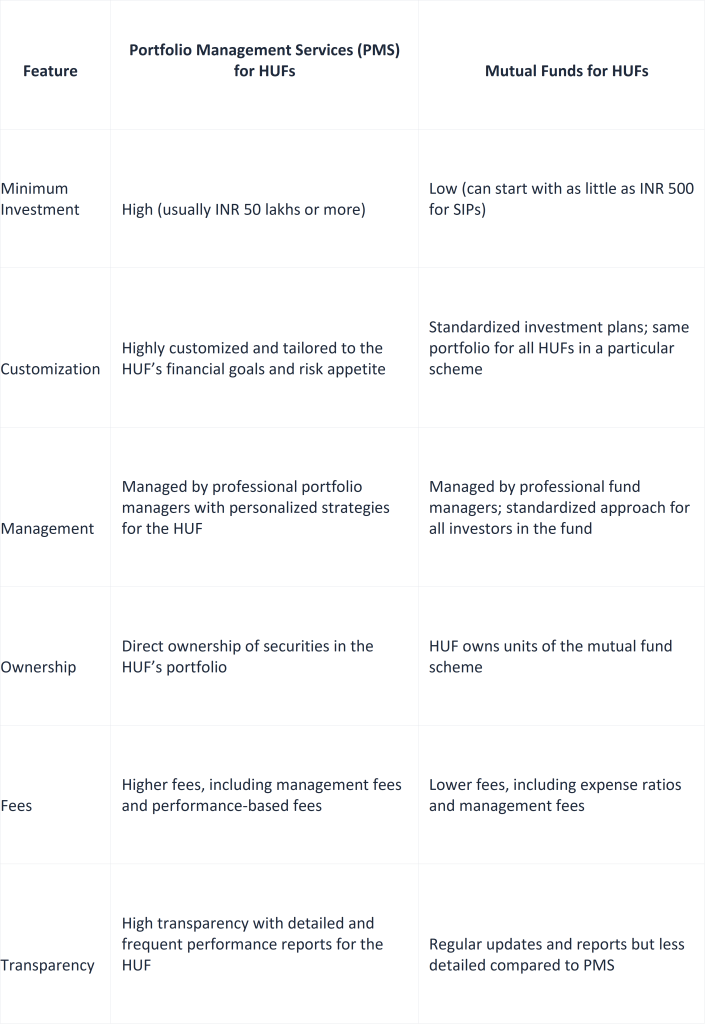Hindu Undivided Families (HUFs) have unique investment needs that require careful consideration to optimize their financial growth. Mutual Funds and Portfolio Management Services (PMS) are two prominent investment options available for HUFs. While Mutual Funds offer diversification, professional management, and liquidity, PMS provides customized portfolios, direct ownership, and potentially higher returns. HUFs must weigh factors such as investment amount, management control, costs, transparency, and risk-return profiles to make an informed decision. Understanding the strengths and weaknesses of each option can help HUFs secure their financial future.
Introduction to Hindu Undivided Families (HUFs)
A Hindu Undivided Family (HUF) is a unique entity under Hindu law, comprising all persons lineally descended from a common ancestor, including their wives and unmarried daughters. The family head, known as the ‘Karta,’ manages the HUF’s affairs. Recognized as a separate tax entity under Indian Income Tax Law, HUFs benefit from specific tax advantages.
Structure of HUF
The structure of an HUF is deeply rooted in the traditional Hindu family system. Key components include:
– Karta: The head of the HUF, typically the eldest male member, with the authority to manage HUF assets and investments.
– Coparceners: Members with a birthright to HUF property, including daughters post the Hindu Succession (Amendment) Act, 2005. They can demand the partition of the HUF.
– Members: Other family members, such as wives of male members and unmarried daughters, who are entitled to maintenance and share in HUF assets.
– HUF Property: Includes ancestral property, property acquired through HUF’s business or investment, and property gifted or willed to the HUF.
– Succession: Follows Hindu law, with property passed from generation to generation, usually with the next eldest member assuming the Karta role upon the previous Karta’s passing.
Advantages of HUF
– Tax Benefits: Enjoy tax exemptions and deductions similar to individual taxpayers, including Section 80C benefits.
– Asset Pooling: Pooling family assets leads to better investment opportunities.
– Estate Planning: Facilitates smooth wealth transfer across generations.
Disadvantages of HUF
– Conflict of Interest: Differing opinions among members can lead to conflicts.
– Lack of Individuality: Earnings and assets are not attributed to any one individual, complicating financial planning.
– Legal Complications: Dissolution or partition can be legally complex and contentious.
Tax Advantages of HUF
HUFs benefit from several tax advantages:
– Separate Tax Entity: Treated as a separate tax entity, reducing overall tax liability.
– Deductions under Section 80C: Eligible for deductions on specified investments, with a current limit of Rs. 1.5 lakh per annum.
– Income Splitting: Transferring assets to the HUF can lower the family’s overall tax burden.
– Tax-Free Gifts: Gifts received from members or other HUFs are tax-free.
– Exemptions and Deductions: Eligible for deductions like medical insurance premiums and housing loan interest.
– Dividend Income: Dividends from Indian companies are exempt from tax under certain conditions.
Mutual Funds vs. Portfolio Management Services (PMS) for HUFs
HUFs can choose between Mutual Funds and Portfolio Management Services (PMS) for their investments. Each option has distinct advantages and disadvantages:
Mutual Funds
Mutual Funds pool money from multiple investors to invest in diversified portfolios of stocks, bonds, and other securities, managed by professional fund managers.
Strengths:
– Diversification: Offers exposure to a wide range of securities, spreading risk.
– Professional Management: Managed by experts, potentially leading to better returns.
– Liquidity: Highly liquid, allowing easy redemption.
– Tax Benefits: Equity-linked savings schemes (ELSS) provide tax deductions.
– Low Minimum Investment: Accessible with relatively small amounts.
Weaknesses:
– Market Risk: Subject to market fluctuations.
– Fees and Expenses: Management fees and expenses can reduce returns.
– Limited Control: Investors have no control over specific investments.
– Performance Variation: Varies significantly based on the fund manager’s strategy and market conditions.
Portfolio Management Services (PMS)
PMS involves a professional portfolio manager managing the client’s investment portfolio, tailored to the investor’s needs.
Strengths:
– Customised Portfolios: Tailored strategies based on financial goals and risk appetite.
– Professional Management: Managed by experts, potentially optimizing returns.
– Transparency: Regular updates and detailed performance reports.
– Direct Ownership: Investors directly own the securities, offering greater control.
– Flexibility: Allows for flexible investment strategies, including active management.
Weaknesses:
– High Minimum Investment: Typically requires a high initial investment.
– Higher Costs: Management and performance-based fees can be significant.
– Risk: Subject to market risks despite professional management.
– Less Liquidity: Lower liquidity compared to mutual funds, making it harder to convert investments to cash quickly.
Key Comparisons
– Investment Amount: Mutual funds require a lower initial investment, making them more accessible.
– Management and Control: PMS offers a personalized approach with direct ownership, while mutual funds provide pooled investments with professional management.
– Costs: Mutual funds generally have lower fees, while PMS justifies higher costs with customized strategies.
– Transparency and Reporting: PMS provides detailed reports, allowing close tracking. Mutual funds offer transparency but less control over individual investments.
– Risk and Return: Both are subject to market risks. PMS can tailor the risk profile for potentially higher returns, while mutual funds offer stable but potentially lower returns.

Conclusion
Both Mutual Funds and Portfolio Management Services (PMS) are viable options for Hindu Undivided Families (HUFs). Mutual funds are accessible, cost-effective, and provide diversification and liquidity, making them ideal for HUFs with lower investment amounts. PMS offers a personalized approach with potentially higher returns and greater control, suitable for HUFs with larger investment capacities.
The choice between Mutual Funds and PMS depends on the HUF’s financial goals, risk appetite, and investment horizon. A well-informed decision can help HUFs achieve financial stability and growth.




